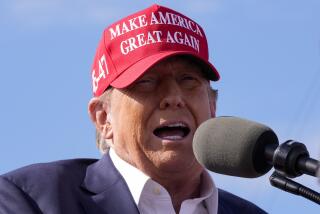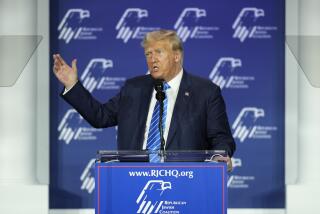From mockery to anger, world’s Muslims react to Trump’s call to keep them out
There was anger. There was disbelief. And there was outright ridicule.
A call by Republican presidential candidate Donald Trump on Monday for a “total and complete shutdown of Muslims” entering the United States after attacks by Islamist extremists in California, France and beyond drew sharp responses across the Muslim world.
“I didn’t know that Donald Trump was fluent in Nazi,” tweeted renowned Egyptian doctor-turned-political satirist Bassem Youssef.
He later posted a picture of himself on Twitter scowling beside a stylized Trump puppet.
He and numerous others noted Trump’s many business dealings in the Muslim world.
“Seems Trump has a selective kind of love for Muslims depending on how deep their pockets are,” Youssef said.
The Khabaristan Times, a Pakistani satirical publication in the vein of the Onion, printed an article claiming that Islamic State was taking credit for Trump. “This blatant attack on America bursts the myth that ISIS is limited to the Middle East and doesn’t have access to the U.S,” the article says, using a common acronym for the militant group.
One of the Middle East’s largest retailers, the Landmark Group, said it was pulling all Trump-branded products from its shelves. The company, headquartered in Dubai, United Arab Emirates, signed a deal in February to sell items from the Trump Home collection at its Lifestyle outlets in the UAE, Kuwait, Qatar and Saudi Arabia, the Arabian Business news site reported.
“As one of the most popular home decor brands in the Middle East, Lifestyle values and respects the sentiments of all its customers,” Chief Executive Sachin Mundhwa said in a statement quoted by the site.
Even before the latest controversy, Trump had begun to raise the ire of some Arab businesspeople.
Last month, Khalaf Habtoor, head of the Dubai-based Al Habtoor Group, said he had admired Trump’s outspokenness and believed that the U.S. was lacking strong leadership.
“I was wrong and I do not mind admitting it. My support for America’s front-running Republican presidential candidate Donald Trump was a mistake,” he wrote in the UAE-based daily the National. “But when strength is partnered with ignorance and deceit, it produces a toxic mix threatening the United States and our world.”
Some other business partners have chosen to ignore Trump’s comments, however.
Damac Properties, another company based in the UAE, said it was pressing ahead with plans to build a Trump International Golf Club in Dubai.
“We would like to stress that our agreement is with the Trump Organization as one of the premium golf course operators in the world,” Niall McLoughlin, a senior vice president at Damac Properties, told the National. “As such we would not comment further on Mr. Trump’s personal or political agenda, nor comment on the internal American political debate scene.”
Egypt’s Dar al-Ifta, the highest religious authority for issuing Islamic edicts, said: “Trump’s hate rhetoric, which describes Muslims as a threat to the American community, is totally erroneous since Islam exhorts peace and coexistence among all humans, and it is unfair to blame all Muslims for the action of a minority that manipulates the fundamentals of the religion.”
“We call on Americans not to give heed to such Islamophobic rhetoric, which creates conflict among citizens and stirs hatred that threatens societal peace in the U.S.,” the statement continued. “It also paves the way for all the extremists to achieve their horrendous and criminal goals.”
Trump’s comments raised concern among some of the many Middle Eastern businesspeople, academics and others who travel regularly to the United States.
Medhat Sayed, an Egyptian businessman who distributes laundry equipment and is the Egyptian agent for a number of American exporters, said he doesn’t understand why people like Trump seem to think that only Muslims benefit from their visits to the United States.
“We do a lot of business with American companies, and we open the way for them to make millions of dollars in gains,” he said. “Even those Muslims who live and work there, they are of great benefit to the American economy.”
Dawlat Murad, a professor of law at Cairo University who has taken part in academic exchange programs and accompanied Egyptian students on short trips to the U.S., said building walls between the U.S. and the Muslim world would only increase tension and hatred.
“The best thing we used to have was going to America and allowing our students to interact with the American people and the American educational system and American values,” she said. “It used to bring people closer and create more understanding between the various cultures. But now this man wants to keep everybody apart, so the misunderstanding will increase and continue.”
Trump’s comments drew scorn in Indonesia, where the real estate mogul has several business investments, including a luxury hotel under development in Bali. In September, a top Indonesian lawmaker, Setya Novanto, appeared with Trump at a campaign event in New York at which the GOP candidate asked, “Do they like me in Indonesia?” Novanto is seen to reply, “Yes, highly.”
The remarks prompted an investigation of Novanto in Indonesia for reportedly violating ethics laws by appearing to endorse a foreign presidential candidate.
An editor at Rolling Stone Indonesia, Hasief Ardiasyah, tweeted Tuesday: “How much do you like him now.”
Mosharraf Zaidi, a Pakistani commentator, tweeted: “The damage Trump is doing is permanent. His supporters are never going to go back to keeping it pent up inside. He’s destroying America.”
Stanly Johny, international affairs editor at the Hindu newspaper in India, tweeted: “When you have #DonaldTrump you don’t need a #Baghdadi, America,” referring to the leader of Islamic State, Abu Bakr Baghdadi.
But other commentators couldn’t bring themselves to take Trump seriously.
Trump “is a lunatic who even makes fun of people with disabilities,” said a Twitter user from Saudi Arabia writing in Arabic. “Don’t know how he will ever be a U.S. president.”
Special correspondents Hassan and Bulos reported from Cairo and Amman, Jordan, respectively. Times staff writers Alexandra Zavis in Paris and Shashank Bengali in Mumbai, India, contributed to this report.
For more international news, follow @alexzavis on Twitter
ALSO
Why Muslims should not have to apologize for the San Bernardino shooting
Analysis: Ignoring Donald Trump didn’t work for Republicans. What now?
Perspective: The ‘Donald Trump Blocker’ iPhone app doesn’t work, but that’s a good thing for America
More to Read
Start your day right
Sign up for Essential California for news, features and recommendations from the L.A. Times and beyond in your inbox six days a week.
You may occasionally receive promotional content from the Los Angeles Times.







